Andrey Pivovarov, one of the leading oppositional politicians in Saint Petersburg, was sentenced to four years in penal colony on charges of coordinating an “undesirable organization” for posts on Facebook.
Pivovarov came into local politics almost twenty years ago. In that time, he has teamed with about a dozen democratic parties, organizations and movements and befriended leaders of Russian political opposition including Boris Nemtsov. Andrey created the city’s first political taproom, defended St. Isaac’s Cathedral from the Church’s attempts to reclaim it, participated in major street protests, helped dozens of independents get elected at municipal elections, and raised money for medics during the pandemic.
Paperpaper.ru talked to Pivovarov’s associates to find out how a brewery owner became a major political figure of Saint Petersburg and Russia, what he has already done for the city, and why his supporters think that it’s still early to put his work in review.
“I remember very clearly the day before I was arrested, the 30th of May [2021]. I took my son to a park, there were a lot of activities and games, and I promised him we’d come back soon,” recalls Pivovarov in an interview to Novaya Gazeta.
On May 31, he arrived at Pulkovo Airport to leave for a vacation. He cleared passport control with no issues and boarded, the plane rolled onto tarmac. Andrey started a movie, worrying that the download wasn’t complete and he wouldn’t be able to see the film to the end. Then Pivovarov realized that the plane was coming back to the terminal and saw a police car approaching. He would spend the next year in a detention center, charged with managing an “undesirable organization.”
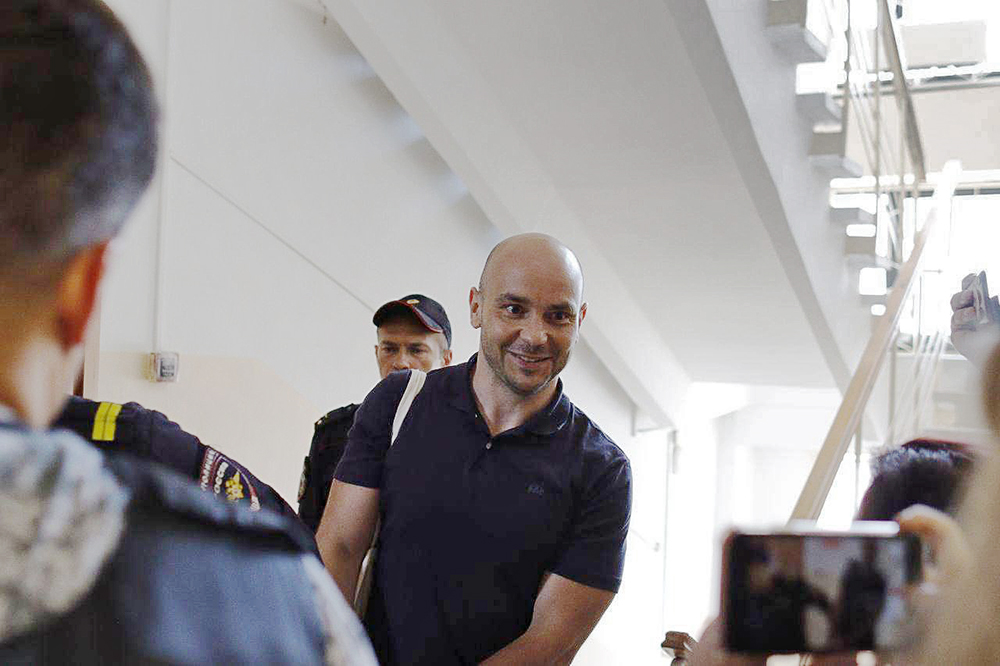
Brewery and the Union of Right Forces: how economist and businessman got into politics and befriended Boris Nemtsov
Andrey Pivovarov was born in Leningrad almost forty years ago. He went to the Saint Petersburg University’s famous Faddeev High School; the institution’s alumni include, for instance, the founder of VK and Telegram Pavel Durov who graduated several years later. An economist by training, Andrey went into business. He held several successive managerial jobs, including a position at Evroset, then owned by Evgeny Chichvarkin, until he started a brewery in the late 2000s: a long-nurtured dream of his and his friends’, according to Pivovarov himself.
Now, as he answers the questions of Novaya Gazeta’s journalist from a detention cell, Pivovarov is reflecting on that experience from a political angle: owning a business, he recalls, introduced him to the ways of Russian officials.
“I still remember our visit to an official in Leningrad Oblast where the brewery was originally located. We needed a formal approval from her and we talked about taxes and how we were going to pay (that was in a really poor district), about the jobs we would create for the locals. But she didn’t care. She yelled at us, telling us we were going to alcoholize people.”
Natalya Gryaznevich who has been Pivovarov’s associate throughout most of his political career, remembers that in business he exhibited the same qualities as later he would in politics: “Plotting out an idea, finding like-minded people, creating a team, making arrangements, solving problems: he always did that well.”
At the time, Pivovarov was already beginning a political career. He became interested in politics during his university studies, according to his own words. In 2004, Pivovarov joined the Union of Right Forces, a mainstream party that had just lost its State Duma fraction a year earlier together with another liberal party, Yabloko.
The Union of Right Forces was then presided over by Boris Nemtsov, Irina Hakamada and Leonid Gozman. Anatoly Chubais and Sergei Kirienko, currently First Deputy Chief of Staff in Putin’s administration, had also stood at the party’s origins. Pivovarov befriended Nemtsov who introduced him to other oppositional leaders, such as Vladimir Kara-Murza, who was in April 2022 sent to jail under charges of distributing “fake news” about the Russian Army.
“There are people with whom you could share the proverbial foxhole,” Kara-Murza wrote in September 2021. “Andrey is certainly one of those people. He is among the most reliable, sincere and passionate people I know.” Nemtsov visited Saint Petersburg in 2010 to go on picket in support of Pivovarov who had been arrested during a mass protest.
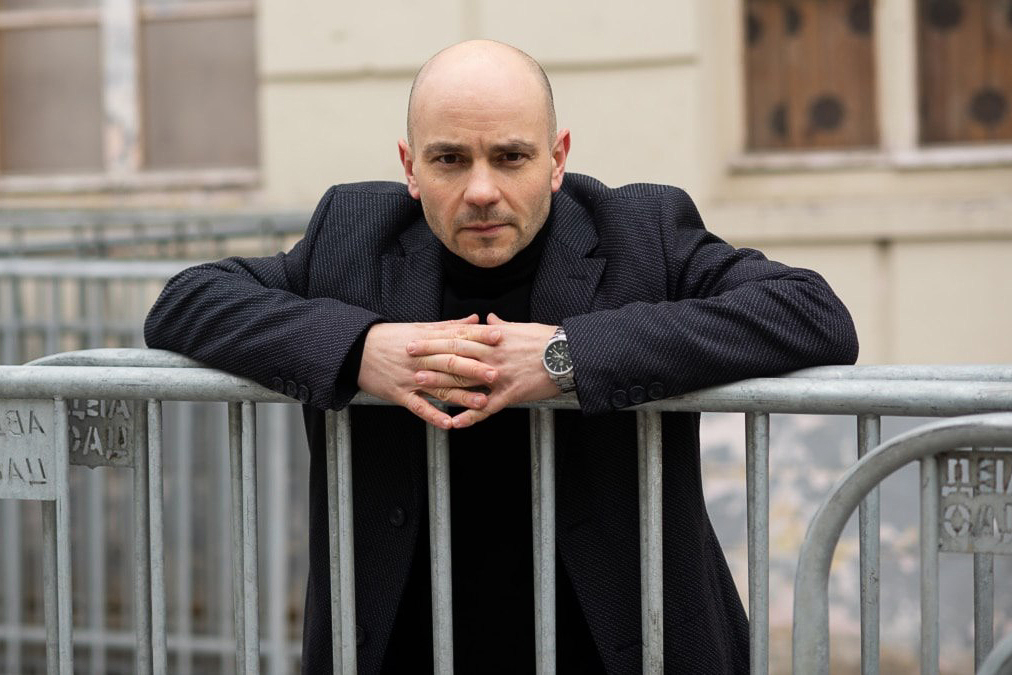
Svoboda Bar and “stool pigeon”: how Pivovarov opened Saint Petersburg’s “first oppositional taproom”
In 2012 and 2013, Nemtsov, Ilya Yashin and other leaders of Russian opposition gave public talks in Svoboda Bar (Russian for “liberty”), an oppositional establishment, which, for Pivovarov, was an opportunity to express both of his passions: business and politics.
“We started out and rapidly became a center of attraction. We provided a venue for any oppositional event that requested it, and pretty much every oppositional group had the floor at one point or another,” Pivovarov recalls.
The idea belonged to Pivovarov and Vadim Sukhodolsky, a politician and activist from Saint Petersburg who met Pivovarov via the Civil Responsibility Movement, of which both were members. Sukhodolsky says that opening the bar was inspired by the upswing of social and political life that followed the protests of 2011-2012. The idea was to create a space for opinion allies.
“Svoboda Bar was created as a public social space for Saint Petersburg people interested in politics where they could meet over a beer to talk about politics, give a public-talk or even hold a debate, and listen to prominent politicians in person. That was before the generation that would open the bars Bakalavriat and Vogel. Svoboda was the first ever bar with a political agenda,” says Sukhodolsky.
Svoboda only lasted for eight months. As would be expected, the bar was routinely subject to provocations, reports to the authorities, and inspection visits. The Young Guard of United Russia, the ruling party’s youth group, sent minors to the bar to buy alcohol. The establishment was reported on to the police for operational violations by the lawyer Anton Shalkov, who was at the time associated with RosUznik, an initiative supporting political prisoners in Russia. That led to an inspection visit and eventually a large fine for not having a sales register machine at the bar. Shalkov claimed that, because of Svoboda, “ordinary people” would “associate political opposition with drinking and partying,” in addition to accusing Pivovarov of rudeness. In response, Pivovarov called Shalkov “a stool pigeon” and “a snitch”, described the lawyer’s complaint as “a useless person’s revenge” and suggested they sort things out “in a manly way” on a boxing ring.
According to Vadim Sukhodolsky, the reasons behind the taproom’s closure were economical rather than political.
“Political pressure was minimal, especially compared to what’s happening now in 2022. Like any self-supporting business, the bar required its owners to invest a lot of time in management: it’s a full-time job, and we didn’t have the resources for combining it with our political and social activities,” Sukhodolsky explains.
That was Pivovarov’s last foray into business; he had pulled out from the brewery in 2011. Later he would explain his decision to give up on business: “Doing a little bit of this and a little bit of that means not having time to have anything done. Having a business also created additional leverage for political pressure. It’s easy to overrun food production with inspections, and I didn’t want to create extra risks for my friends.”
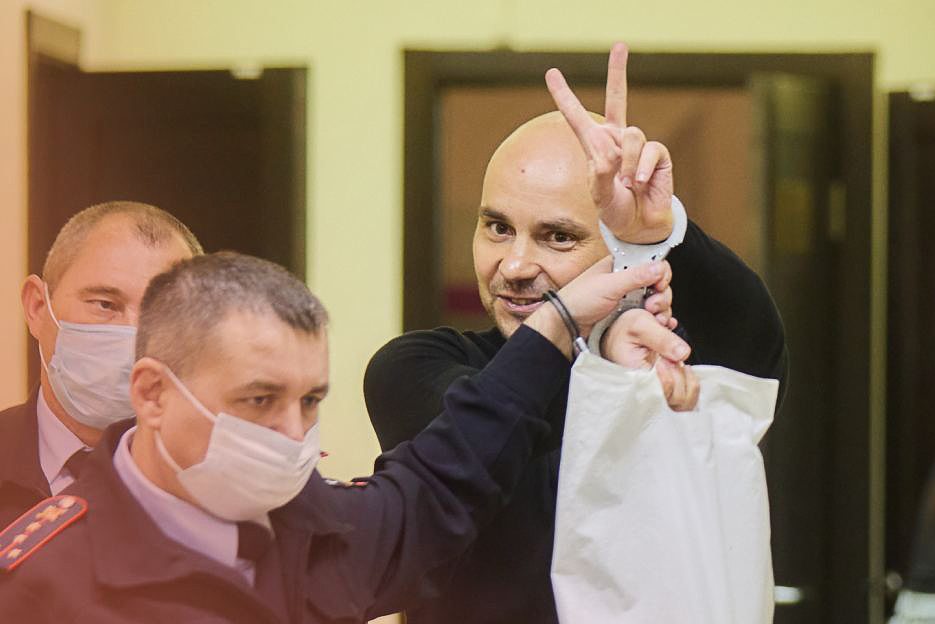
Parnas and Ukraine: how Pivovarov won intraparty strife on the eve of the annexation of Crimea
When Saint Petersburg’s local news website Fontanka covered the opening of Svoboda Bar, the story mentioned several political movements and parties: RPR-Parnas, Defense, Solidarity, Civil Responsibility. All these had two things in common: adherence to democratic values and Pivovarov’s membership.
In the 2000s, Pivovarov teamed with many democratic movements active in the city. Among those was Defense (Oborona), created by the Yabloko Party’s young activists, which was Ilya Yashin’s entry point in politics; Mikhail Kasyanov’s People’s Democratic Union of Russia; Strategy 31 initiated by Eduard Limonov. Pivovarov was arrested for 14 days for coordinating the latter’s rally in 2010: at the time the media described the punishment as “unusually harsh.” Nemtsov and Limonov personally vouched for him, as did member of the city parliament Maxim Reznik, who had known Pivovarov for nearly all of the latter’s political career.
“We go way back to 2003 or 2004. After I became Yabloko’s chair we met via the Defense youth movement,” Reznik recalls. “We were on the same platform but belonged to two competing structures. He changed affiliations frequently, which I understand on a personal level.”
Defense made an important platform for Pivovarov early in his political career. That was where he met several of his allies, including his closest associate Natalia Gryaznevich and Maxim Reznik.
“He attracted people, and many would join any project he came up with just because the project was his,” says Gryaznevich. “It’s worth a lot to have a group of friends and allies ready to answer your call and work hard. That makes a leader. Andrey is certainly a leader.”
In 2012, Pivovarov’s political pursuits led him to joining Mikhail Kasyanov’s RPR-Parnas Party. Soon after, the politician became entangled into a conflict with the party’s regional chapter, and the local leadership decided to expel him. Konstantin Yershov, head of the regional chapter, blamed Pivovarov for neglecting his assigned duties and publicly criticizing the party’s local leaders. Yershov’s ally Vyacheslav Dolinin described Pivovarov’s team as “unscrupulous people” who “should go to United Russia or the LDPR.” Pivovarov, in turn, made statements describing the decision to expel him as “cowardly revenge by people who are afraid of internal competitors.”
“Andrey has always wanted to get ahead and ascend in politics, but it’s very important for him to avoid false steps or getting entangled in some shady episode. He understands the importance of good reputation and cares about it as much as he can. He’s sensitive to mistakes. He is actually very careful and thoughtful, even though he may appear rude,” says Natalia Gryaznevich.
The party’s federal leadership—Nemtsov, Yashin, and Kasyanov—had to interfere. They sided with Pivovarov who would become the regional chapter’s co-chair in 2013. Yershov eventually left the party.
On March 1, 2014, Putin requested approval by the Federation Council, the Russian Parliament’s upper chamber, for deployment of the Russian Army on Ukrainian territory. Pivovarov was among the first politicians in Saint Petersburg to react. Together with Maxim Reznik, he announced the creation of an “anti-war committee” on the same day. However, although Pivovarov and Parnas participated in anti-war protests, they did not fully commit themselves to that agenda, as a lot of resources were dedicated to municipal elections that were to be held later that year. The campaign ended in failure, which Pivovarov himself admitted: only one member of Parnas won a seat.
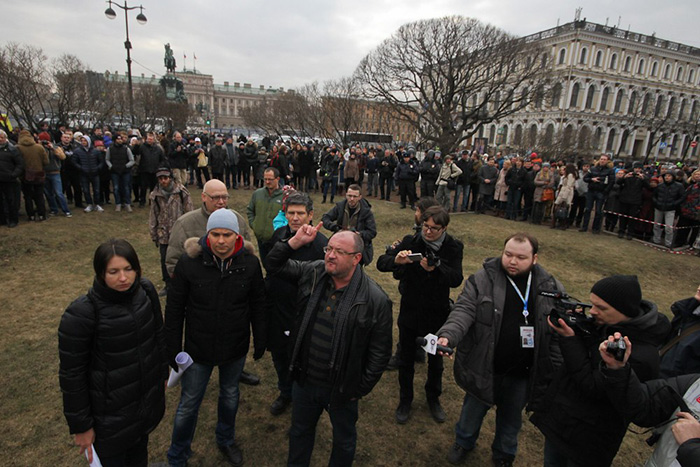
The criminal case and Putin: how Pivovarov organized the Nemtsov memorial march and was jailed in Kostroma
On the night of February 28, 2015, Boris Nemtsov was shot dead at Moskvoretsky Bridge in Moscow. Pivovarov’s response on social media was succinct: “I don’t want to say anything. Tomorrow, St. Petersburg, 1 pm, the Solovetsky Stone [monument to victims of Soviet state terror]. March 1, 2 pm, Gorkovskaya [metro station].” It was the beginning of annual Nemtsov Marches; Pivovarov was the coordinator of the first one and of many that followed.
“We used to think that we could stay at home, because Nemtsov would go out and speak out for us. That we could stay silent because Nemtsov would express all the thoughts we only say in private. Now he’s gone, now there’s no one to speak out for us. There’s no one to organize marches and give speeches. It’s our turn to do that—your turn,” Pivovarov said from a stage that was set up at the Field of Mars. Paperpaper.ru’s video coverage of the rally was made by Sasha Skochilenko, who is now in jail under charges of spreading “fake news” about the Russian Army.
Once again a watershed event of Russian history coincided with an election campaign. Andrey Pivovarov ran for Kostroma Oblast legislature, which gave him countrywide exposure. As it often happens with prominent oppositional politicians in Russia, his recognition was due to legal pressure rather than election results. Pivovarov became a suspect in a criminal case of abuse of power: investigators charged him of bribing a police officer to gain access to the voter database. The politician was sent to a pre-trial detention center.
The case was among the major events in Saint Petersburg politics that year but also received nationwide significance: Putin personally commented on the investigation. The president, who usually shies away from making comments on political cases and delegates responsibility to investigative authorities, appeared confident that Pivovarov was guilty and made it clear he was familiar with the case: “He paid money, gave a bribe, and the police officer confessed. It needs to be sorted out with a clear head. The officer made a confession: yes, I was given money and I took it, and I gave access to the police database in turn.”
Police officer Alexei Nikanorov did admit receiving a bribe from Pivovarov, however, according to the politician’s lawyer, recanted his testimony and claimed it was given under investigators’ pressure.
The court’s sentence was relatively lenient. While investigation was ongoing, Pivovarov was admitted to bail of 1 million roubles: a decision that would be unthinkable in a political case today. Naturally, Pivovarov was found guilty, but instead of the penalty requested by the prosecution—three years of suspended imprisonment and a fine of 2,25 million roubles—the court sentenced him to 1.5 million in fines (the sum was reduced to 1 million in appeal) and prohibited him against holding public office for a year and a half.
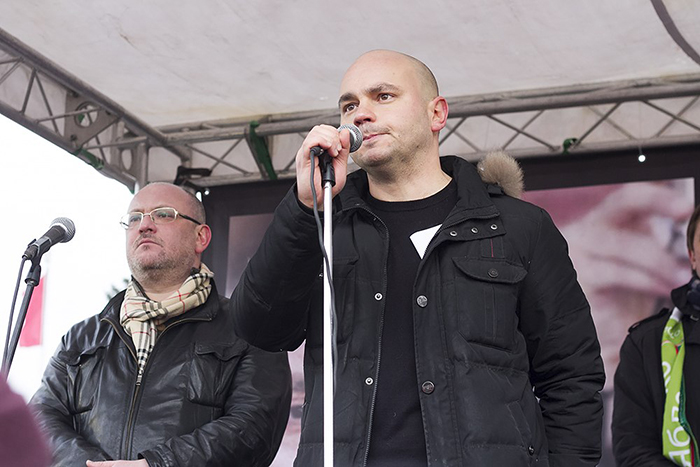
Protests and United Democrats: how Pivovarov defended St. Isaac’s Cathedral, coordinated rallies and led the opposition to success at municipal elections
In 2014, Pivovarov and his closest associates, Natalia Gryaznevich and Sergei Kuzin, established a Saint Petersburg branch of Mikhail Khodorkovsky’s Open Russia Foundation. Two years later, Open Russia was restructured into a political movement with Pivovarov and his team in charge of its local chapter.
Pivovarov’s role as Open Russia’s coordinator was perhaps the most important factor contributing to his recognition among residents of Saint Petersburg. In this capacity the politician joined the Saint Petersburg Urban Protection Committee in 2017. The committee organized protest rallies against handing over Saint Isaac’s Cathedral, the city’s major landmark that has been public property since 1928 and hosts a museum, to the Russian Orthodox Church. The protests had the largest turnout in years. Following the rallies, the authorities backed out of handing over the building to the church, although, naturally, never admitted that public discontent was the reason behind the decision. Pivovarov had a role in coordinating nearly every major street protest since then and was repeatedly arrested for that.
“Andrey is very good at organizing and he does it in a creative way. He knows how to negotiate. We found common ground with very different political forces, including the National Bolsheviks. All the exciting things in Saint Petersburg he either suggested or participated in,” says Pivovarov’s associate Sergei Kuzin.
Eventually, Pivovarov entirely dedicated himself to Open Russia’s activities. He and his allies left Parnas because of an ideological split with its chairman Kasyanov after the party backed the nationalist Vyacheslav Maltsev as their candidate in the Duma election. Pivovarov’s team protested the decision.
“It was important for Andrey to keep up his reputation. He thought that nominating the nationalist Maltsev was a big mistake,” says Gryaznevich. “When the party refused to admit the mistake, he decided he could no longer be a member. I won’t say it was easy. Andrey had invested a lot into Parnas in Saint Petersburg: a lot of effort, time, and money.”
Although Pivovarov no longer belonged to any party, he kept on actively working on preparing independent candidates for elections. The pinnacle of that work was the United Democrats initiative, which supported independent candidates in preparation for municipal elections in Saint Petersburg in 2019. Pivovarov’s allies all agree that United Democrats made the largest impact of all of his projects in Saint Petersburg. Hundreds of oppositional politicians were elected to the city’s municipal councils in 2019, thanks in no small part to Pivovarov’s efforts. The story was covered by Paperpaper.ru in detail.
Pivovarov’s political and social work continued during the pandemic. In 2020, he mounted a campaign against constitutional amendments under the title “NO!” and raised money on protective gear for Saint Petersburg medics: during the first months of lockdowns many health workers complained about shortages. That brought him under pressure once again. Shortly before his arrest, Pivovarov was summoned to public prosecutor’s office for questioning; the management of the Petrodvorets District Ambulance Station had filed a report against him to the police, although members of the station’s staff confirmed to Paperpaper.ru that protective gear had been in short supply until Open Russia got involved.
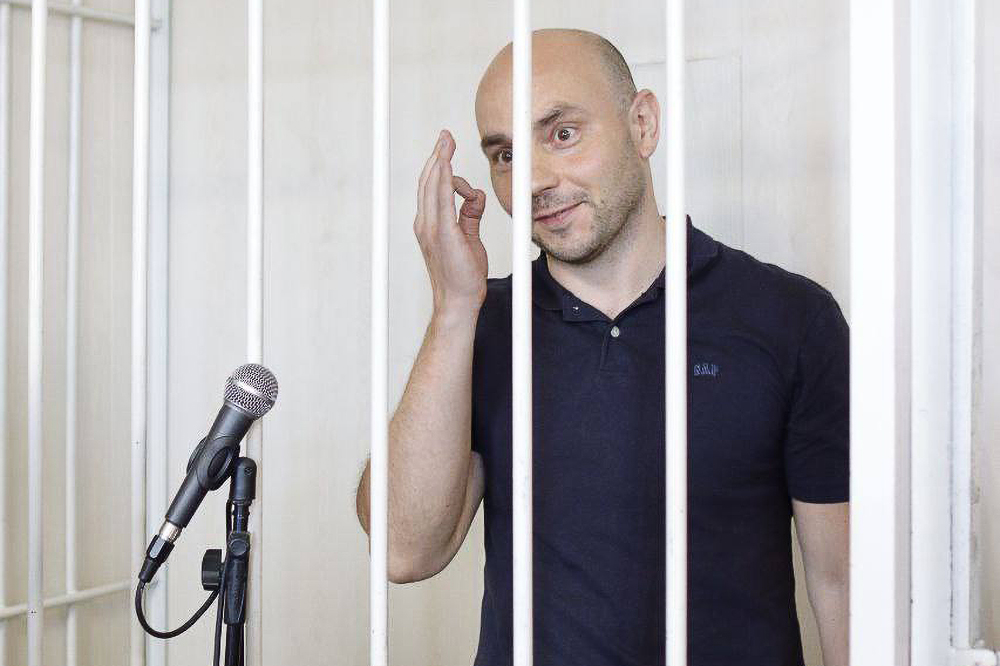
The arrest and the future: why Pivovarov’s allies think that his main achievements are yet to come
In 2018, Pivovarov was elected Open Russia’s head of national management. Pivovarov’s associate Sergei Kuzin believes that it was the real reason behind the politician’s arrest. In Kuzin’s opinion, it was hardly coincidental that it happened only a few months after the arrest of Alexey Navalny.
“[Navalny’s] Anti-Corruption Foundation and Open Russia were the two strongest political organizations. It’s quite obvious why Navalny and Pivovarov were both put away. After Andrey’s been arrested, there isn’t any political life to speak of in Saint Petersburg or in Russia in general. Everything has been trampled and suppressed,” says Kuzin.
Open Russia had to be shut down in 2021. Technically, it was not deemed an “undesirable organization”, as the status was assigned to the eponymous organization registered in the UK. That, however, did not stop law enforcement agencies from persecuting members of Open Russia. Pivovarov announced the shutdown to prevent further persecution of the movement’s sympathizers.
“He knew very well that they were going to send him to prison, and, personally, I think his decision to stay in Russia anyway was a mistake. He wouldn’t agree with me, of course,” says Natalia Gryaznevich.
Pivovarov planned to run for the State Duma in 2021. In the end of May, siloviki arranged a sting operation and arrested him when he was on a plane preparing for takeoff. It turned out that a criminal case had been opened against Pivovarov under charges of coordinating an “undesirable organization.” The grounds for commencement of the case were a Facebook post by a representative of Krasnodar Krai legislature, which Andrey shared on his page, about a fundraising effort for a local activist’s election campaign. The defense insisted that it wasn’t Andrey himself who shared the post but his social media manager. The prosecution then introduced 34 more entries from the politician’s page into evidence, including posts about raising money for medics during the pandemic and about the United Democrats initiative. The criminal indictment also mentioned coordinating a civil forum in Nizhny Novgorod.
The court sent Pivovarov to a detention center in Krasnodar pending trial. Even from jail, the politician took part in an election: Yabloko agreed to nominate him as their candidate for Krasnodar Krai’s Duma seat. Andrey has been outspoken about the war in Ukraine while in detention.
“The world has changed, but in jail everything around me remains the same: the walls, the rules of conduct, the prison porridge,” he wrote in his letter to Holod Media in May. “I wonder if prison is the stability that United Russia has promised us for years. Bombs explode and people die not far away from where I am. But here, the clinking of keys and prison bars is the only sound I hear.”
In conversation with Paperpaper.ru Maxim Reznik brings up a quote from the famous film adaptation of Mikhail Bulgakov’s The Heart of a Dog. “What was my life’s most important event?” asks the anti-hero Sharikov, and hears in response: “The most important event in your life is yet to come.” “I don’t want to look back on what Andrey did. Andrey will do a lot more for Russia and for Saint Petersburg,” Reznikov adds.
“The regime’s agony will be violent, like that of any monster. But it’s agony and it won’t last long. One needs to be brave and resilient, like Andrey. His sentence doesn’t matter. They might as well give him 127 years, 9 years to Navalny, 99 years to Yashin, it wouldn’t matter. They’re in prison because Putin is in power, but his days are numbered,” says Reznik.
Sergey Kuzin thinks that there isn’t any political life to speak of in Russia or Saint Petersburg after Pivovarov’s arrest. Natalia Gryaznevich, like Maxim Reznik, refuses to review the results of Pivovarov’s work.
“It’s too early to look back on his work. We haven’t seen his main achievements [in Saint Petersburg politics] yet. He’s still very young for a politician,” says Gryaznevich.
Like other political prisoners—Navalny, Kara-Murza, Yashin, and the many defendants in cases against “spreading fake news” about the Russian Army—Pivovarov in his speeches insists that a future is near when posts on social media, speaking out and running for office will not be punishable by prison term. “See you soon in our new, desirable and open Russia,” he said in his final plea on July 11, 2022.
On July 15, Pivovarov was sentenced to four years of general regime penal colony and eight years of prohibition of holding a public office. If the appeal court upholds the verdict, Pivovarov will be released in December, 2024 (whereas pre-trial detention counts towards prison term, one day in jail equating a day and a half in colony according to the law).
In his interview to Novaya Gazeta a year earlier, Pivovarov recalled that he had never finished a football game with his son on the day before his arrest. “I’d very much like to find out who wins,” he said.
Paperpaper.ru — is independent media from Saint-Petersburg, Russia. We’ve been reporting on the Russian-Ukrainian war since the day it started. As a result, our website was blocked by the Russian government.
For 10 years we’ve been writing about the local community, business and initiatives. Yet, our main goal was always to improve life in the city we love.
We are Russian-language media but now we translate our the most significant articles to share it with our English speaking audience. Help independent journalism — save the freedom of speech!
